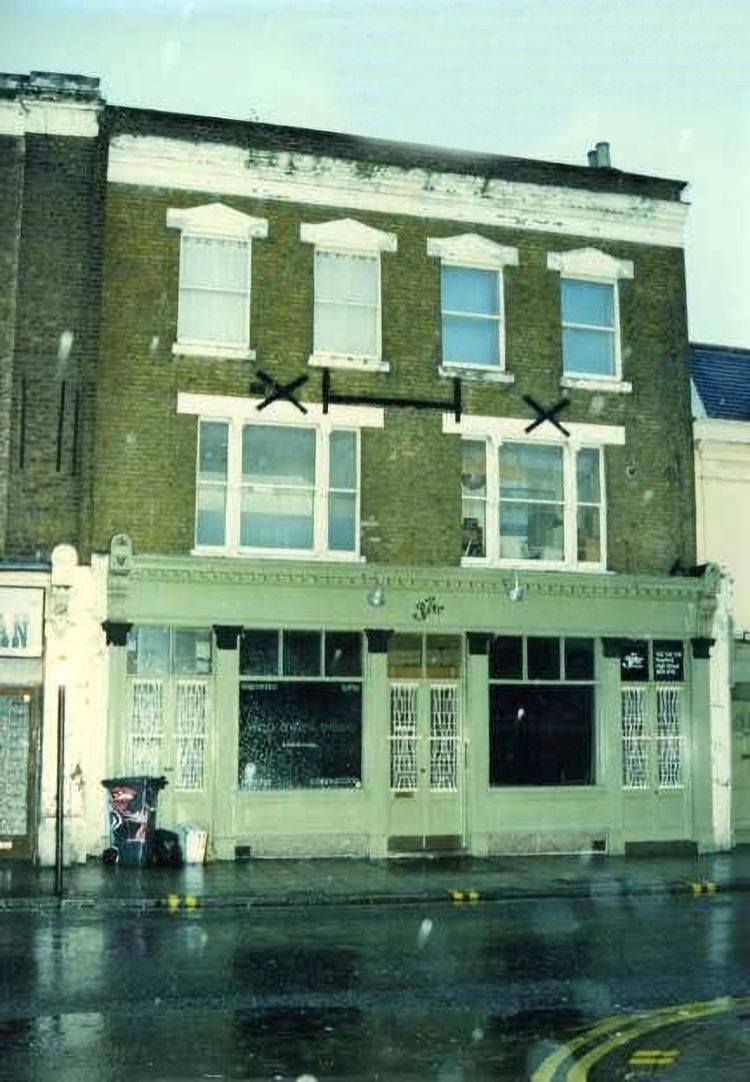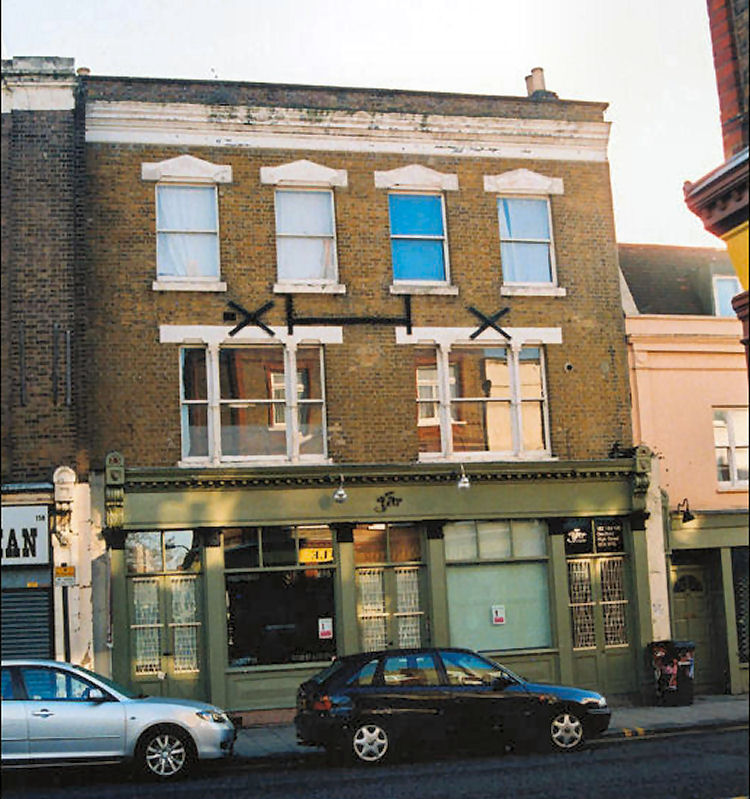|
From the Morning Advertiser, 24 August, 1843.
GREENWICH.
Yesterday a most extraordinary scene was enacted in this Court by Dr.
Drury and a select portion of the followers of the great Teetotal
Apostle – a woman named Elizabeth Gleeson being placed at the bar on a
charge of violently assaulting a Mr. Abbott, a fly proprietor, at
Dartford, and smashing a quart pot, the property of Mr. Benjamin Dawson,
landlord of the “Brown Bear,” High-street, Deptford, during one of the
meetings held by the Reverand Father Matthew in the above anti-teetotal
town.
Mr. Abbott stated that he was standing near his stables, under the
Railway arches, listening to the speeches, or rather, watching the
speakers, for it was impossible to hear, when he observed the prisoner
hammering a huge piece of stone with a quart pot. He told her that it
was very unjust to destroy a man’s property like this, when she used a
very bad expression, and struck at his head with the pot, but he warded
off the blow with his arm, which was much hurt, and at the moment he
thought his arm was broken, she said if she did not smash the pot, she
would smash him. He never touched her, or spoke to her, except as he had
stated.
The defendant:- Oh, no, no. I never struck at your head. I’ve studied
the law. (laughter.)
Mr. Jeremy:- Studied the law! How do you mean!
Defendant:- Why, Why, I have learnt the law a little, and I know I must
not break a man’s head with a quart pot. (Renewed laughter.)
Mr. Jeremy:- You have made a nice distinction in law between smashing a
man’s head with a quart pot, and smashing the pot itself; but I think
you have been “assuming a virtue which you have not.” Speaking to you as
a student-at-law, I should say you had not a legal coolness to pocket an
affront, and look for legal redress. Your knowledge has not taught you
that the wilful destruction of property is a minor offence, although it
has convinced you that splitting a man’s head is something like a
capital one.
Defendant:- I’ve been teetotal for five years; ever since my husband
died.
Mr. Jeremy:- How! Does the loss of a husband lead to taking another
pledge” but I will not press the question, perhaps you took timely
warning. Where do you come from?
Defendant:- From Ratcliff highway.
Mr. Jeremy:- That’s a long was to come.
Defendant:- No distance is too far to come to see Father Matthew; but I
say there is no blow; I never struck him, and there is no mark to show
for it.
Mr. Jeremy:- Do you wish to have coular demonstration of it!
Defendant:- Certainly.
The complainant bared his arm and showed a very disagreeable bruise.
Defendant (exultingly):- Look there’s no wound.
Mr. Jeremy:- No, but there are marks of a blow.
Defendant:- It looks to me more like a pinch then a blow.
Mr. Jeremy:- If that be the case, pots can pinch pretty hard –
(laughter) – and however much we may like temperance in liquor, we must
take care that in curing one disorder we do not bring on worse.
Physicians and lawyers ought always to study that. We can deal with
drunken people, and punish them, but we can’t so easily cure broken
heads and bruised limbs.
Defendant:- They all jeered at me, and the man Abbott called to me and
others to drink, and none called out “if they don’t, throw it over
them.” An attempt was made to effect the latter, but he got hold of the
pot.
Mr. Dawson produced the pot, which bore testimony to the teetotal
prowess, being literally indented, and a hole struck through the bottom,
rendering it perfectly useless to the supporters or opponents of Father
Matthew, as far as holding either Adam’s ale, or extra stout was
concerned. He knew nothing of the occurrence.
The complainant declared he had not drunk a drop of beer or spirits that
day, and never touched the pot except to rescue it.
A man named Jones was called, who deposed to the facts either sworn to
or admitted as above, and most positively sworn that the complainant
never used any expression of disapprobation or insult, and that he was
quite sober.
Mr. Jeremy:- And how was the lady?
Witness:- Why, I should say she could not be sober when she was knocking
a pot against stones. Besides that, there was a regular row among the
Teetotallers, who were most of them drunk. (Laughter.)
Mr. Jeremy:- No! Come let me hear the truth; are you not going a little
too far?
Witness:- Well, I may be mistaken, but they called out “Kill the ____;
do ‘en up; cut ‘em up.” They didn’t look very sober.
The defendant persisted in the truth of her defence, and called John
McLaughlin, who said he lived in Deptford. He was at the meeting, and
saw the row. He was not close by, but a few yards off; he could not be
particular to a yard; perhaps it was from 50 to 60 yards. Defendant’s
feelings appeared to be “hurted” at the pot being offered, and there was
a rush and a scrimmage, and the pot got the worst of it. Being jumped
upon by at least a dozen people. Complainant did get a blow, but not from
the woman.
Mary Murphy, a pretty Irish girl, was next called, and deposed that she
also came from Ratcliff highway to see Father Matthew.
Mr. Jeremy:- But why did you make such a pilgrimage? He will come and
see you all in turn. I wish you would have a little patience.
Miss Murphy:- I can’t see the dear man too often.
Mr. Jeremy:- And have you taken the pledge?
Witness:- Yes.
Mr. Jeremy:- What! One so young and pretty not to have strength of mind
to resist temptation! (Laughter.)
Witness:- There is nothing like taking the pledge after all.
The witness then went on to say that she had heard a great deal of “speechifying,”
and a great many people didn’t like to hear it. As there was a great
deal of bustling about she could only hear a talking, but nothing that
was said. The “bustle” was not altogether about the pot of beer – it was
“a general row.” She would swear that the complainant had the pot of
beer, and offered it to the defendant.
Mr. Jeremy:- Will you venture to swear that, when you admit the general
confusion?
Witness:- I will.
Mr. Jeremy:- Then you are swearing very rashly, and I cannot place
confidence in your evidence. The other witness on your side has not
ventured to say the complainant offered the pot.
Jones said that McLaughlin could not have seen the whole of the
transaction, as he was acting as usher to these who were taking the
pledge, and was decorated with a green riband, a medal, and a rosette.
Mr. Jeremy said his view of the case was, that in the confusion few
people could see the transaction throughout. He should, therefore, take
the positive evidence of the complainant, confirmed as it was by a
perfectly disinterested individual.
The defendant said several more witnesses had been promised her; but
they had not come.
Mr. Jeremy said that he did not like the bringing forward evidence as it
had been for the defence; that evidence was very unsatisfactory for him,
although, at the same time, he believed there had been provocation
offered by some one, though not the complainant. That person might
seemingly in their own parishes and discuss the question was legal, and
would, probably, be beneficial; but the defendant had studied the law to
little effect if she supposed persons might wander about, from district
to district, as champions of a cause, to disturb others and excite these
adverse feelings which led to a breach of the peace. Taking into
consideration the provocation on either side, he would endeavour to
allay the commotion by simply ordering the damaged pot to be paid for.
He, however, scarcely thought that he ought to let the matter pass over
without binding the defendant over to keep the peace.
Dr. Drury, who had on more then one occasion attended at this Court and
defended the cause of his country people, here started up, and on
rising, said that Jones had sworn to a lie.
Mr. Jeremy:- Now, Mr. Drury, pray don’t interfere. I have come to a
conscientious decision.
Mr. Drury:- No; it is out of opposition to a grand principle.
Mr. Jeremy:- I really have a disposition to soothe this abolition of
feeling, but I cannot allow myself or my office to be insulted.
Dr. Drury:- There is no man has a greater respect then I have for you as
a man or a magistrate; but here is a woman with nothing proved against
her, whom you condemn. I say you are wrong, and I am astonished that a
man of your general good sense, should come to such a decision. I am
annoyed at the idea of it. You have treated that poor woman ill; but
what’s to pay!
Mr. Dawson:- 2s. 4d.
There’s the money, said Dr. Drury, indignantly throwing down
half-a-crown.
Mr. Jeremy:- Now, do not be so violent. I wish to heal all this
disagreeable feeling, and you, as a Doctor, ought to apply a “plaster.”
(Laughter.)
Dr. Drury:- It is illegal; that is what I say.
So say I, said Mr. Pyrke, a broker, of Deptford bridge.
Outrageously scandalous, shouted a posse in the place.
The confusion here became general in the Court. The Magistrates sat
placidly. Dr. Drury took possession of a portion of the Bench, Mr. Pyrke
jumped up on a chair and endeavoured to harangue. Ultimately, after some
screams and fights, the inspector and about twelve or fourteen officers,
cleared the Court vi et armis, (with force and arms) the Magistrates not
taking notice of the contempt of Court.
|

